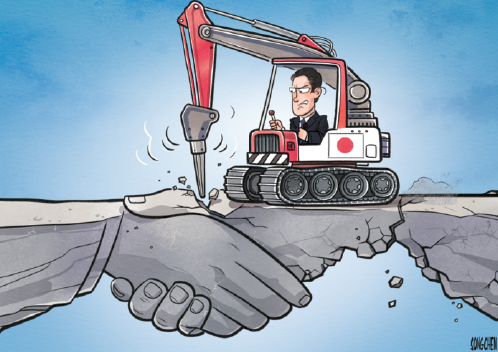Li Yang
At the G7 summit held in Hiroshima last week, Tokyo failed in its attempt to “whitewash” its plan of draining the nuclear contaminated water from the Fukushima nuclear plant into the Pacific. The opposition from its allies was so strong that the summit’s joint statement did not include any endorsement of the plan. Instead, it said that the G7 group supports an “independent investigation by the International Atomic Energy Agency” into the matter.
That’s not surprising. The Japanese government intended to include in a joint statement of the G7 Ministers’ Meeting on Climate, Energy and Environment it hosted in Sapporo, Hokkaido, in April that the G7 group supports, if not welcomes, its disposal of the contaminated water by discharging it into the ocean. However due to the fierce opposition of other countries, particularly Germany, the Japanese government was unable to do that. At the G7 summit, food, wine and snacks made in Fukushima Prefecture were offered to the participants as well as representatives of foreign media who were covering the event. However, this publicity stunt backfired as the food and drink was not popular, as no third-party had been invited to test the products from Fukushima to see whether they contain radioactive materials. Meanwhile, what is known is that a growing number of studies by other countries have indicated that the contaminated water from Fukushima contains at least 60 radionuclides, and the concentration is too high for them to be completely filtered out. That means directly discharging the water into the ocean, a process that would take decades to complete, would likely cause unimaginable harm to the marine ecology and human health.
Refusing any third-party probe, Japan has instead fabricated a series of lies to justify its waste water disposal plan, which serves its own political and financial interests. Except the United States, which chooses to endorse it in exchange for Japan doing its bidding in geopolitical games, almost all parties, including the Japanese people, oppose, or have concerns about, Tokyo’s cost-cutting plan for ridding itself of the nuclear contaminated water.
As the only country in the world that has been attacked by nuclear weapons as well as one renowned for its culture stressing harmony between humans and nature, Japan should handle the issue with due prudence and responsibility. But although the IAEA has yet to release its assessment of Japan’s plan, the Japanese government has already made its wheeler-dealer attitude on the issue clear to all. With the pipelines to be used to discharge the water into the sea being completed by the end of next month, it will only be a matter of time before Tokyo makes its irresponsible waste water disposal plan a fait accompli.
The China Daily







